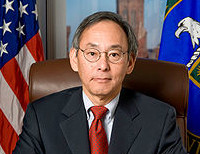
Nobel Laureate and Former Energy Secretary Steven Chu
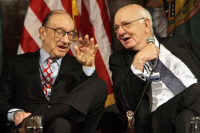
Former Fed Chairs
Alan Greenspan & Paul Volcker
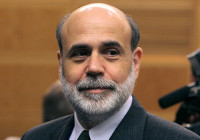
Former Fed Chair Ben Bernanke
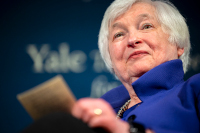
Current Secretary of the Treasury and
Former Fed Chair Janet Yellen
Link to video
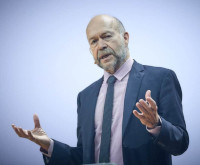
Climate Scientist
James Hansen

Climate Scientist
Katharine HayHoe
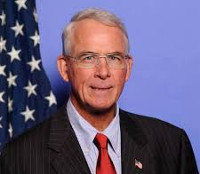
Former Rep Francis Rooney R-FL
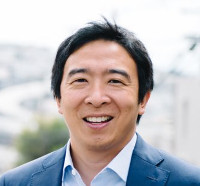
Andrew Yang
Democratic Presidential Candidate
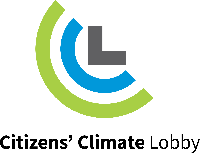
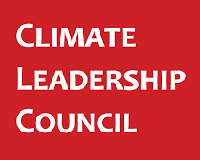
|
Details
Impose a fee on carbon, and have the
government return the money equally to
everybody in the form of a monthly dividend
immediately, before the
politicians can get their grubby fingers on it.
Revenue neutral
.
- The carbon fee should be imposed at the
wellhead, or when fuel is imported.
- The dividend payments should be frequent,
perhaps monthly, because poor people who really
need the dividend to make ends meet in the face of
higher energy costs often can't wait a year for
the help.
- The fee should also be imposed on gases released
into the atmosphere as a side effect of
production, and it shouldn't just be a simple fee
on carbon, since some chemicals are more potent
greenhouse gases. So a severe fee should be
imposed on methane that is leaked into the
atmosphere without being burned in natural gas
drilling, since methane is much more potent than
CO2 as a green house gas.
- Border adjustments (otherwise known as tariffs)
should be
imposed on goods imported from countries that
aren't imposing similar carbon fees, to protect
American producers from unfair competition from
goods imported from countries that don't have such
fees. This gives other countries an incentive to
impose their own carbon fees, so they get the
money rather than our government getting the
money. This avoids the need for ambitions,
grandiose
international treaties that are nearly impossible
to get together and even harder to enforce. Revenues
from the tariffs would be used to subsidize exports to
countries without a carbon tax.
- In practice, a few high-income people are emitting
far more GHG's per capita than the rest, so
others, which includes most voters, would be getting more
money back in the dividend than they would be
paying in higher energy costs, so they would come
out ahead, which would create a political
constituency to keep raising the fee until it is
high enough to motivate the desired reductions in
emissions. Also, once people see that they are
receiving monthly checks, that also creates a
constituency opposed to the politicians diverting
the revenues to other ends.
- The incentives provided by the carbon fee will
render a lot of legislation redundant and
unnecessary, so that regulations can be
repealed,
moving decision making from bureaucracy and courts
to more efficient and optimal market-based
decisions.
- Generally, it will be much simpler and more efficient
for industrialists and policy makers to make decisions
based on a fossil fuel price that is taxed to reflect
ecological harm, rather than having to hire armies of
lawyers to make heads or tails of the reams of Byzantine
regulation that would otherwise be necessary.
Drawback
- Unlawful residents would be negatively impacted,
since they would face higher energy costs yet not
receive the dividend. However, by the same
argument, social security, medicare, medicaid, and
unemployment insurance should all be abolished,
since unlawful residents pay taxes that support
those programs and don't receive the benefits. It is virtually impossible to
run any kind of decent society without
sometimes negatively impacting unlawful
residents. That's just a basic,
unavoidable fact of reality.
Current Action on Carbon Fee
and Dividend
- The
Energy Innovation and Carbon Dividend Act
(EICDA, H.R. 5744)
is a bill in the federal house of
representatives. Initially sponsored in the
last session by several Republicans and numerous
Democrats, it was re-sponsored in the current
session, and as of April 2, 2022 was co-sponsored
by 96 Representatives, and gaining a few more
representatives every month. It was just re-introduced
in the currnt congress in October, 2023.
-
Citizens' Climate Lobby is an organization
dedicated to bipartisan solutions to climate change.
They focus on many climate bills, particularly
EICDA.
- The
Climate Leadership Council is a Republican
group with a plan very, very similar to the
EICDA, except
that they don't have a bill in
congress, and their version exempts the fossil
fuel industry for legal liability for any fraud
they may have perpetrated by telling the public
that climate change is not real while internal
documents showed that they knew this wasn't the
case. The EICDA does not have
this exemption -- it leaves open the possibility
of legal action against fossil fuel companies.
- The idea of a carbon fee and dividend as the
right approach to solving climate change is
endorsed by:
- all living ex-Fed chairs
- 28 Nobel Laureate economists
- 15 former chairs of the Council of Economic
Advisors
- 2 former treasury secretaries
- and 3623 other US economists.
The endorsements above are for the
general concept of a carbon fee and dividend, and not
specifically the EICDA
or the Climate Leadership
Council's proposal. There are
other endorsements and editorials
supporting the idea.
Elon Musk has
endorsed the idea of a "price on carbon",
but his opinions on
Carbon Fee and Dividend, specifically, are
unknown.
|










